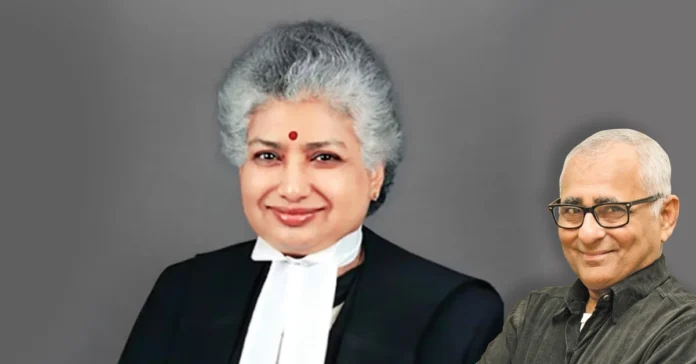By Inderjit Badhwar
In a courtroom often defined by unanimity, one voice has chosen the harder path—standing apart, questioning, dissenting. That voice belongs to Justice BV Nagarathna. Her latest dissent, sharp and unflinching, is not just another judicial footnote; it is a reaffirmation of the power of principle over convenience, of conscience over conformity.
For those who follow the rhythms of the Supreme Court, Justice Nagarathna’s name is not new to dissent. In 2023, when the majority upheld the government’s controversial demonetisation move, her lone dissent stood out for its clarity, constitutional rigour, and moral conviction. She argued not from populism or political calculation, but from fidelity to constitutional processes. It was then, as it is now, an act of courage that reminded us why dissent is not a sign of weakness, but of institutional strength.
Her latest stand is part of a growing constellation of dissents that reflect her steadfast commitment to judicial independence. At a time when conformity within institutions can seem easier, her insistence on adhering to constitutional first principles offers not only legal clarity, but also moral leadership. It is this quality that has given her dissents a life far beyond the pages of law reports—they enter public discourse, shape legal consciousness, and inspire future generations of lawyers, judges, and citizens.
I must admit, my admiration for Justice Nagarathna is not merely professional. A few years ago, I had the privilege of meeting her in person at the home of one of the most revered figures in India’s judicial history, former Chief Justice of India MN Venkatachaliah. We were gathered to wish him a speedy recovery from a brief ailment. Justice Nagarathna was then already on the Supreme Court, and yet her charm, humility, and easy, smiling demeanour created an atmosphere of warmth rather than formality. Over cups of tea, as we conversed casually, I was struck by the magnetic quality of her presence.
What was most remarkable, however, was the breadth of her knowledge. The conversation flowed seamlessly from constitutional interpretation to literature, from economics to philosophy. Her erudition was not the heavy, intimidating kind one often associates with legal minds, but the generous sharing of a deeply cultivated intellect. That afternoon, I felt deeply privileged to be in the company of a woman destined to lead the Supreme Court as India’s first woman Chief Justice in 2027, and to be having that conversation in the home of Justice Venkatachaliah—himself the Chief Patron of our magazine and one of the great architects of modern Indian jurisprudence.
Dissents in judicial history have often been remembered more than majority opinions. Justice HR Khanna’s lone dissent during the Emergency, upholding the right to life and liberty when the majority bowed to executive pressure, remains etched in our collective memory as a beacon of courage. Justice Nagarathna’s words carry the same potential to resonate long after the present controversies have faded. In many ways, she is scripting the future, not merely for the judiciary but for the republic itself.
What makes her dissents so significant is not just their legal acumen, but their timing. At a moment when questions of institutional autonomy, executive overreach, and constitutional balance dominate our public life, her insistence on principle serves as a reminder that the judiciary must never be reduced to a rubber stamp. Dissent, in her hands, becomes both shield and sword: a shield to protect the Constitution and a sword to pierce through complacency.
For our readers, this cover story is more than a legal chronicle. It is an invitation to reflect on the role of individuals within institutions, on the costs of courage, and on the enduring truth that a single voice, when anchored in conviction, can echo louder than the chorus of conformity. Justice Nagarathna exemplifies the truth that judicial independence is not sustained by structures alone, but by the conscience of those who inhabit them.
As we place her on the cover, it is not only to celebrate a dissent, but to honour a tradition. The tradition of judges who see their role not as guardians of power, but as custodians of the people’s rights. In that sense, Justice Nagarathna is both the present and the future of India’s judiciary.
When she assumes the mantle of Chief Justice in 2027, the nation will not merely be witnessing a milestone in gender history; it will be inheriting a legacy of integrity, courage, and unyielding fidelity to constitutional values. Until then, we will continue to watch her dissents not as footnotes to majority judgments, but as living documents of judicial conscience.
Her latest dissent is not just law—it is legacy. And it is our privilege to bring that legacy to our readers, on our cover, at this pivotal moment in the history of India’s democracy.


